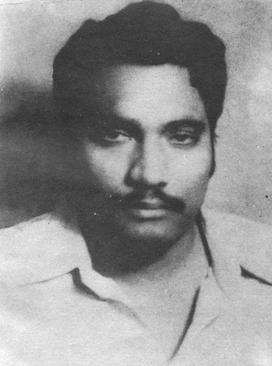
Politics of Bangladesh takes place in a framework of a parliamentary representative democratic republic, whereby the Prime Minister of Bangladesh is the head of government, and of a multi-party system. Executive power is exercised by the government. Legislative power is vested in both the government and parliament. The Constitution of Bangladesh was written in 1972 and has undergone seventeen amendments.

The Bangladesh Nationalist Party is a major political party in Bangladesh. Founded on 1 September 1978 by the late Bangladeshi president Ziaur Rahman, with a view of uniting people with a nationalist ideology, BNP later came out as one of the two most dominant parties in Bangladesh, along with its archrival Awami League. Initially being a big tent centrist party, it moved towards more right-wing politics later.

The prime minister of Bangladesh, officially prime minister of the People's Republic of Bangladesh is the chief executive of the government of Bangladesh. The prime minister and the cabinet are collectively accountable for their policies and actions to the Parliament, to their political party and ultimately to the electorate. The prime minister is ceremonially appointed by the president of Bangladesh.

Hussain Muhammad Ershad was a Bangladeshi military officer and politician who served as the president of Bangladesh from 1983 to 1990, heading a military dictatorship.

Bangladesh elects on national level a legislature with one house or chamber. The unicameral Jatiyo Sangshad, meaning national parliament, has 350 members of which 300 members are directly elected through a national election for a five-year term in single-seat constituencies while 50 memberships are reserved for the women who are selected by the ruling party or coalition. The Prime Minister is the head of the government. The president who is the head of the state is elected by the National Parliament. The president of Bangladesh is a ceremonial post and does not exercise any control over the running of the state.

The Jatiya Party is a centre-right, conservative, nationalist political party in Bangladesh and is currently the main opposition in the Jatiya Sangsad, against the Awami League. The current chairman of the party is Begum Rowshan Ershad. On 3 January 2019, the party announced its decision to join the Bangladesh Awami League-led Grand Alliance after having been in opposition for the previous parliamentary term. However, the party backtracked the next day and announced that it intended to remain part of the opposition. Currently, it holds Rangpur out of Bangladesh's 12 city corporations.
The Bangladesh Krishak Sramik Awami League (BaKSAL) (Bengali: বাংলাদেশ কৃষক শ্রমিক আওয়ামী লীগ, English: Bangladesh Worker-Peasant's People's League; বাকশাল) was a political front comprising the Bangladesh Awami League, the Communist Party of Bangladesh, the National Awami Party (Muzaffar) and Bangladesh Jatiya League.
Purba Banglar Sarbahara Party is a communist party in Bangladesh. The party played a role in the independence struggle of the country. In the early 1970s it engaged in armed struggle supporting the new Bangladeshi state. Since then its political fortunes have dwindled, having suffered from several waves of internal divisions. The group remains active, and still carries out attacks against its opponents.

General elections were held in Bangladesh on 29 December 2008. The two main parties in the election were the Bangladesh Nationalist Party (BNP), led by Khaleda Zia, and the Bangladesh Awami League Party, led by Sheikh Hasina. The Bangladesh Awami League Party formed a fourteen-party Grand Alliance including Ershad's Jatiya Party, while the BNP formed a four-party alliance which included the Islamist party Jamaat-e-Islami. The election was originally scheduled for January 2007, but it was postponed by a military-controlled caretaker government for an extended period of time.

The Jatiya Samajtantrik Dal is a political party in Bangladesh. The party was founded by Serajul Alam Khan. The party was very dominant during 1972–1975 Bangladesh insurgency.

Siraj Sikder was a Bangladeshi revolutionary politician.
The 20 Party Alliance was a Bangladeshi coalition of right-wing political parties, led by the Bangladesh Nationalist Party. It was originally formed as the 18 Party Alliance on 18 April 2012 in Dhaka, extending its predecessor the Four Party Alliance. The 20 Party Alliance was formed as an effort to strengthen the opposition's demands for restoring the caretaker government system used between 1996 and 2008. The main rival of this alliance is the Grand Alliance, led by Awami League which came into power after the election in 2008.

General elections were held in Bangladesh on 30 December 2018 to elect 300 directly-elected members of the Jatiya Sangsad. The result was another landslide victory for the Awami League-led Grand Alliance led by Sheikh Hasina. The elections were marred by violence, and were widely considered by opposition politicians and the international community to be rigged.

The 1990 Mass Uprising, popularly known as '90's Anti-Authoritarian Movement, was a democratic movement that took place on 4 December and led to the fall of General Hussain Muhammad Ershad in Bangladesh. The uprising was the result of a series of popular protests that started from 10 October 1990 to topple General Ershad who came to power in 1982 by imposing martial law and replaced a democratically elected President through a bloodless coup.
1972–1975 Bangladesh insurgency refers to the period after the independence of Bangladesh when left-wing Communist insurgents, particularly the Gonobahini fought against the government of the Prime Minister Sheikh Mujibur Rahman.

Socialism is one of the fundamental principles of the Constitution of Bangladesh, along with nationalism, democracy and secularism. The constitution names Bangladesh as a people's republic, and declares all powers to be vested to the people. However, in Bangladesh, as a liberal democracy, the reference of "socialism" is generally used to describe the state's goal to construct an exploitation-free society, rather than its original meaning and implementation, which is characterised by social ownership of the means of production, as opposed to private ownership. The constitution allows cooperative and private ownership along with state ownership.
2018 Bangladesh election violence refers to a series of brutal attacks, mostly on opposition party candidates and clashes between ruling and opposition party men centering on the general election on December 30, 2018.
During the 1990s, leader of the BNP Khaleda Zia formed a coalition against Ershad's military regime. 7 political parties joined Khaleda in this coalition.

General elections are held in Bangladesh to elect members of the Jatiya Sangsad, the unicameral national parliament. The Jatiya Sangsad consists of 300 members elected by first-past-the-post voting in single-member constituencies and 50 seats reserved for women, which are allocated based on the proportional vote share received by parties. Elections are overseen by the Bangladesh Election Commission.




















